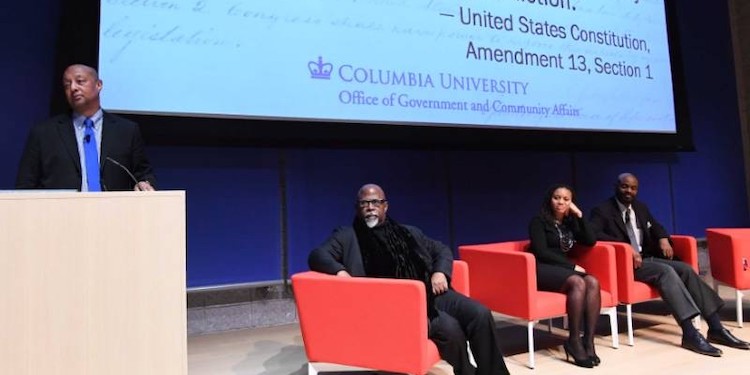Criminal Justice Change

Government and Community Affairs (GCA) works with a variety of University and community partners on issues of justice in education and criminal justice change in order to help address a need in the Upper Manhattan community. By building connections between the theoretical work, research, and programs at Columbia and the work being done in the community, GCA aims to facilitate the creation of a more robust understanding of and network to address incarceration, reentry, and their economic impacts within the community.
To accomplish these goals, GCA works with numerous university and community partners, including those listed below.
Special Initiatives
The ReEntry Acceleration Program (REAP) at Columbia Business School trains MBA students to deliver business training to incarcerated individuals, develops tools for potential employers, and creates forums for new relationships to shape a solutions-focused dialog around post-incarceration employment.
Visit the REAP website to learn more.
The Center for Justice at Columbia University is committed to reducing the nation’s reliance on incarceration and advancing alternative approaches to safety and justice through education, research, and policy. Its mission is to help transform a criminal justice system from one that is driven by punishment and retribution to one that is centered on prevention and healing. The center is interdisciplinary and built around community collaboration. It works in partnership with schools, departments, centers, and institutes across Columbia, other universities, government agencies, community organizations, advocates, and those directly affected by the criminal justice system.
Initiatives include:
Go to the Center for Justice website to learn more about all of the programs.
The Justice Lab combines original research, policy development, and community engagement to propel the project of justice reform. In our vision, justice depends on peaceful and healthy communities that help all their members to flourish in a climate of fairness and respect. We work for a community-centered justice, in which incarceration is no longer used as a solution to problems that are often rooted in poverty and racial inequality.
Learn more at the Columbia Justice Lab Website.
The mission of the Center for the Study of Law and Culture at Columbia University (CSLC) is to facilitate interdisciplinary study, research, and scholarship on the intersections of law and culture.
Starting from the twin premises that law is a cultural form and that culture carries the regulative force of legal practices and norms, the CSLC seeks to advance a wide range of work in law and culture studies. Embracing an expansive definition of culture as a concept whose boundaries range from the aesthetic to the political, the CSLC supports projects that understand law in a strict institutional or positivist sense, as well as those that approach law more generally as a regime for ordering social life, constructing cultural meaning, and shaping group and individual identities.
CSLC projects emanate from the understanding that law can no longer be adequately analyzed as though it were exogenous to the realm of culture. In keeping with its broad mandate, the CSLC offers an intellectual home for teaching, research, and scholarship across disciplines.
Learn more at the Center for the Study of Law and Culture website.
The Center for Institutional and Social Change undertakes multi-method, collaborative research projects with innovative institutions and individuals pursuing full participation and institutional citizenship goals, within and across specific institutional settings. The center's research methodology includes qualitative and participatory action research, surveys, network and stakeholder mapping, and collaborative inquiry.
Go to the Center for Institutional and Social Change to learn more.
The Justice in Education Initiative works with other university- and community-based organizations to conduct courses, workshops, and creative projects on campus and in local prisons. Our programs open channels of communication and collaboration between Columbia faculty and students, communities affected by incarceration, and the public for a more just and socially conscious system of higher education.
Go to the Justice in Education Initiative website to learn more.